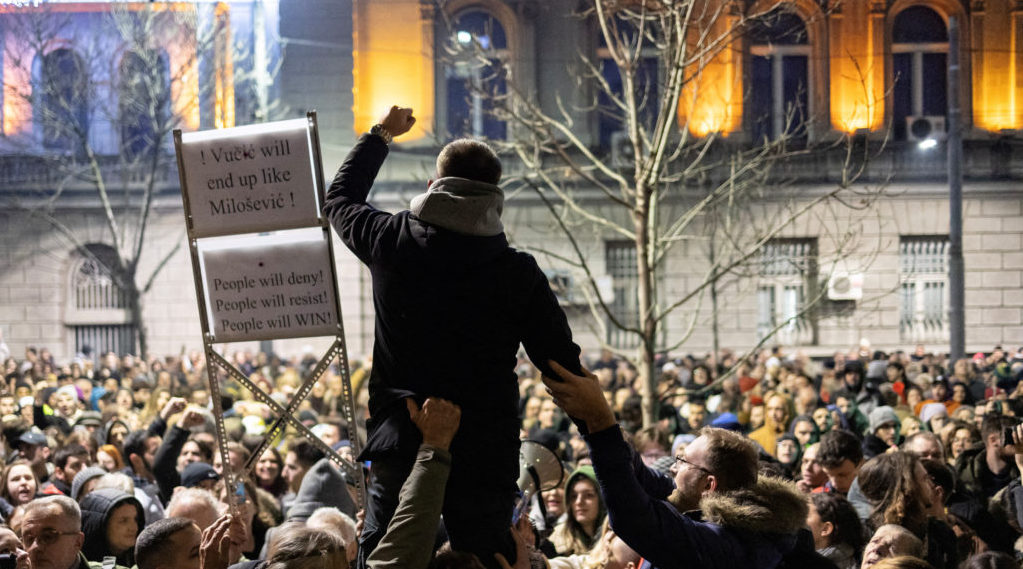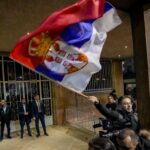The elections have become this year’s main political event in the Western Balkans. After all, they will determine the future of Serbia, the vector of its movement, and most importantly, whether President Aleksandar Vučić will retain his authoritarian style of governance or the election results will force him to change. Therefore, he did not even risk leaving the country to participate in the EuCo-Western Balkans summit on December 13.
On the morning of November 27, the Republican Election Commission of Serbia announced that 18 parties and blocs were allowed to participate in early parliamentary elections. They are very different in terms of political colors, but the sections of campaign programs related to the domestic life in such different parties are in many ways similar – Improving the quality of life, increasing pensions and salaries, reforming the education and health care systems, revitalizing the economy and curbing inflation, ensuring fair justice, human rights, and much more. Differences remained in some foreign policy issues – relations with Ukraine, Russia, China, Kosovo settlement, and European integration.
Here are the first results and the new format of the Assembly.
So far, 95% of the ballots in the election to the People’s Assembly have been processed. According to tentative results, the “Aleksandar Vučić – Serbia Must Not Stop” bloc is the winner, gaining 46.71%. The pro-European opposition Movement “Serbia against Violence” is the runner-up with 23.58%.
The coalition “Ivica Dacic – Prime Minister of Serbia” scored 6.579% (the worst result since 2007, sp Dacic has already announced his intention to step down as head of the party as it needs new faces), “We are the Voice of the People” party led by the candidate put forward by a group of citizens, Bronislav Nestorovic, unexpectedly received 4.69% (notably, the party HQ celebrated the results with the Soviet song Katyusha), the right-wing bloc “Hope for Serbia” has 14 votes, which is 5.03%. “Dveri” and “Zavitnyki” received 2.7% each. In addition, two Bosnian and Hungarian parties will obtain 10 seats.
One of the main results of the elections was that the parties from the right-wing pro-Russian opposition, which had the most critical views on the issue of non-recognition of Kosovo and the introduction of Russia sanctions, did not make it to parliament. The election was literally a failure for those who bet on support for Russia and active contacts with key Russian officials during the campaign. Consequently, these ideas do not find support among Serbian voters, which should be taken into account by President Vučić in forming Serbia’s future foreign policy course.
At the same time, the “Serbia against Violence” coalition launched a protest rally outside the Republican Election Commission, declaring its disagreement with the election outcome and its falsification, at least in Belgrade. The opposition claims that more than 40,000 people without fixated residence address were brought to Belgrade en masse to support the pro-government coalition, which they say radically changed the outcome of the elections in the Serbian capital. The SAV demands that the elections in Belgrade be declared invalid and call for another vote, along with the “purge of the voter list.”
Preliminary results allow predicting the format of the new composition of the People’s Assembly.
Pro-government coalition. A. Vučić’s SPP retained the majority, and the alliance with the traditional partner, Dacić’s Socialists, gives them the opportunity to fully control the Assembly and form the government. This new (read ‘old’) majority will most likely be supported by all political actors, except for the “Serbia against Violence” movement and, perhaps, Bronislav Nestorovic.
Most likely, Vučić and Dacić will play together again, even despite some differences between them and the open demands of the socialist leader to become the head of government. He laid down his wishes in the very title of his electoral list and in an interview with the Beta agency, saying that he would become the best prime minister for Serbia. It seems that Vučić is generally okay with such an idea, as he is not against replacing Ana Brnabić. Now the new candidate is here, loyal and predictable, even in spite of some existing issues.
Foreign policy will not be fundamentally changed, and denial of Russian sanctions and independence of Kosovo; Euroscepticism; political and military neutrality of Serbia; and balancing between West and East will remain its characteristic features.
However, after the victory, Vučić found himself in a difficult situation. In the near future, he must demonstrate to the EU (and the US) his vision and readiness to accept Western proposals regarding the Kosovo settlement, start implementing his obligations in this context, and finally decide whether Belgrade will join Russia sanctions. A positive answer to these questions will create conditions for renewing the country’s European integration course. Otherwise, there’ll be isolation from the EU, termination of financial aid, and reduction of economic cooperation.
The recognition of Kosovo, even de facto, means the need for amendments to the Constitution, which will result in the political death for Vučić. Does he need it? Probably not. The situation forces the president to choose a strategy of delaying decision-making, while at the same time going for some concessions. Perhaps he will join the Russia sanctions effort. His decision will be influenced by geostrategic changes going on across the world, which will inevitably affect Serbia.
Somewhere between the opposition and the pro-government bloc sits Nestorovic, who does not want to “dissolve” his party across the ruling blocs, especially in Belgrade. Although already after the elections were over, he declared that he would not join any coalition with 99% probability. Most likely, given his pro-Russian views and “soft” Serbian nationalism, he will be a situational ally for both Vučić and the opposition. And sometimes he will criticize the government, but not as harshly as the parliamentary right-nationalist parties “Dveri” and “Zavitniki” did.
Opposition. The “Serbia against Violence” movement becomes the main opposition force in the Assembly. Such a result in the conditions of absolute dominance in mass media of the pro-ruling party is a serious bid for the future and evidence of the emergence of a formalized democratic opposition. Civil opposition has never had seen a result before. And therefore gaining almost a quarter of mandates in the Assembly will be considered an important victory.
The movement has no unity as there are multiple contradictions between the participants. Therefore, it faces the task of consolitating unity and preparing for new elections, which, according to Vučić, will be held only in 2027.
It is relevant to note that neither the SPP nor the SPS could achieve the results of the 2020 parliamentary elections. Socialists are losing seats for the third election in a row – from 31 mandates in 2020 to 18. But Vučić’s party, compared to the 2022 elections, increased the number of mandates by only 8 – from 120 to 128 (preliminary results).
What are the features of the 2023 election campaign?
The first is the information blockade of the pro-European opposition in Serbian mass media. It was Vučić and SPP who became media “stars” in Serbia as most of the outlets are controlled by the authorities. Their force snatched 20 to 50% of TV reports and print media publications during the election campaign. The Russian Sputnik and RT Balkan were among the government’s loudest mouthpieces.
The second is the emergence of a civil initiative of concerned citizens, ProGlas, whose emergence in the political arena was initiated by a group of public opinion leaders, convinced of the need to “wake citizens up and return stolen Serbia to them” by snubbing Vucic.
The third is the clear support of Vučić expressed by some foreign leaders. During the election campaign, the Russian ambassador often appeared on TV and in other media, praising the situation of Serbia and its president. Viktor Orban sent a letter of support to Vučić with his own praise and wishes for victory, which contributed to the support of the pro-government bloc by Serb-Hungarians. Meanwhile, Milorad Dodik said he would definitely vote for Vucic. Speaker of the Montenegro Assembly Andrija Mandic, who holds a Serbian passport, was also in Belgrade.
Fourth – neither the topic of Russia sanctions nor that of Kosovo turned out to be dominant during the entire election campaign. Most of the participants in the election race diligently evaded them, and those forces that had chosen them as their prominent ones ultimately failed.
The fifth is the fear of being punished for refusing to support the pro-government bloc. As a result, several employees of municipalities in different parts of Serbia were injured, as reported by local media. That was an act of intimidation targeting other state or municipal employees.
Sixth – Kosovo Serbs helped Vučić win. Allegedly, they were forbidden to vote in the Serbian communities of Kosovo and therefore they were forced to travel to Serbia. But there was no official ban from Pristina. The Kosovo government did not ban voting, but recalled that existing practice requires the state hosting the election to request permission to open polling stations. Belgrade did not want to take such a step, as it could be perceived as a de facto recognition of Kosovo’s independence. And that’s why hundreds of buses and cars in the early hours of December 17 left for the cities in Serbia, to the election sites specially designated for Serbs from Kosovo. So far, there is no data on how the voting took place there, but these people did vote. And most likely, they cast ballots not in favor of “Serbia against Violence”.
Seventh – the opposition, for the first time in recent years, almost caught up with the pro-government coalition in Belgrade receiving 43 seats in the city’s Skupština out of 110, which creates opportunities to influence municipal affairs. The good result came despite the fact that over the last month, almost 50,000 personal cards without a fixed address registration were issued in the city, and hundreds of buses brought up to 40,000 foreign voters to the capital, mainly from BiH’s Republika Srpska.
And finally, the eighth – the elections were held with massive violations: manipulation of electoral lists, fake voters being driven to polling stations in Belgrade and other large cities, violations of election protocols, physical attempts to prevent citizens from casting their ballots, attacks on observers, buying up votes, and other breaches. They also include the president’s promises of an additional pension, EUR 80 bonuses to socially vulnerable population groups, and salary increases for state employees. A large number of violations led to the fact that the opposition did not recognize the outcome of the vote in Belgrade and on the same evening held a protest rally demanding another election.
The EU, USA, and even OSCE expressed their concern and sharp criticism over a large number of violations. In turn, Russia wasn’t happy either. But it wasn’t about violations. It’s about he fact that nationalist and pro-Russian parties, except for “We are the Voice of the People”, are not represented in the Assembly. Therefore, as per Russian media, “Serbia must be dealt with.”
So this happened on Sunday, and now everyone is waiting for the final results. It is clear that Vucic managed to retain and further consolidate his power. He received the opportunity to avoid making decisions that would be dangerous for him “today” and to delay this moment for as much as possible by correspondingly delaying the process of constituting the Assembly and government, for which the electoral law gives him up to 120 days.
And on the other hand, everyone saw that the time for change and democratic transformation in Serbia had not yet come.



